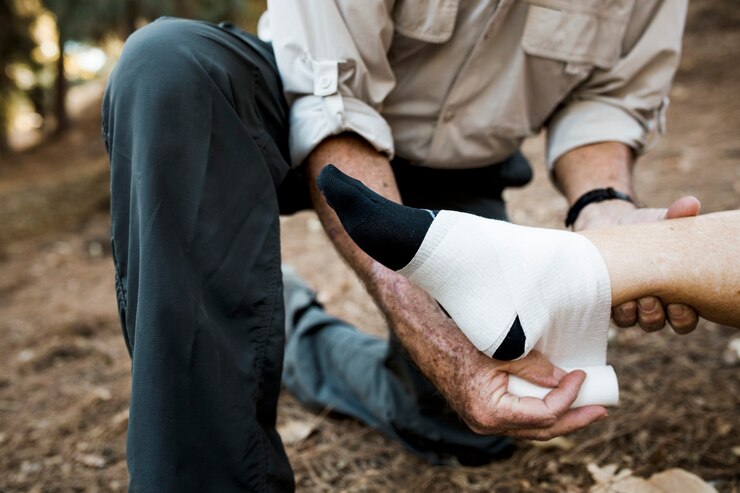HEALTH
4 Types of Injuries That Will Have a Long-Term Impact on Victims

Not every injury heals completely. Some leave a lasting mark, affecting mobility, independence, and overall well-being for months, years, or even a lifetime. These are called long-term injuries. Their impact goes far beyond their physical limitations.
By anticipating their challenges, we can be better prepared for recovery and access the support needed to navigate this difficult journey. An experienced personal injury attorney can help victims secure the resources they deserve to manage the long-term effects of such injuries.
Given below are four injuries that have a permanent impact on an accident victim’s life.
Traumatic Brain Injury (TBI)
A blow to the head can cause a Traumatic Brain Injury (TBI), disrupting the normal functioning of the brain. TBIs range from mild concussions to severe injuries that can lead to a coma. Even a seemingly minor bump can have lasting consequences.
According to the Centers for Disease Control and Prevention (CDC), millions of people experience TBIs each year in the US alone.
The long-term effects of TBI vary depending on the severity of the injury. Many people experience problems with concentration, memory, and thinking. Everyday tasks that were once easy can become frustrating. Mood swings, depression, and anxiety are also common.
Thankfully, there are treatment options available for TBI. Rehabilitation programs can help people relearn skills and cope with their challenges.
Spinal Cord Injuries (SCI)
A Spinal Cord Injury (SCI) occurs when damage disrupts the communication between the brain and the body. This can cause paralysis, or loss of movement, in different parts of the body, depending on the location of the injury.
The severity of an SCI can range from incomplete injuries, where some feeling and movement remain, to complete injuries that result in paralysis below the injury site. Paraplegia refers to paralysis in the legs and lower body, while quadriplegia affects all four limbs and the torso.
Living with SCI presents significant challenges. Mobility can be severely limited, requiring wheelchairs or other assistive devices. Daily activities like dressing, bathing, and managing bladder and bowel function may be affected. Chronic pain is also a common issue for many SCI patients.
Thankfully, advancements in rehabilitation and assistive technologies are offering new hope for people with SCI. Rehabilitation programs can help individuals regain strength and independence, while innovative technologies like robotic exoskeletons assist with walking and movement.
Burns
Burns are injuries caused by heat, chemicals, electricity, or sunlight. Their severity depends on the depth and extent of the damage. First-degree burns, like mild sunburns, affect only the outer layer of skin and usually heal without scarring.
However, second- and third-degree burns, which reach deeper layers or destroy the skin entirely, can leave permanent scarring and require extensive medical care. According to the American Burn Association, over 450,000 people in the US require medical treatment for burns each year.
Beyond the initial pain, burns can have lasting consequences. Scarring can be physically disfiguring and emotionally distressing. Chronic pain and limitations in movement are also common. Burn victims may also experience post-traumatic stress disorder (PTSD) due to the traumatic nature of the injury.
Specialized wound care and scar management are crucial for minimizing these long-term effects and promoting optimal healing.

Amputations
Amputation is the surgical removal of a limb or body part, often due to accidents, disease, or circulation problems. While prosthetics can restore some functionality, amputees face significant challenges. Phantom limb pain, a sensation of pain or discomfort in the missing limb, is common.
Mobility limitations and the need for physical therapy to adapt to using a prosthesis are ongoing hurdles. Body image adjustment and emotional support are also crucial for amputees navigating this life-changing event.
Thankfully, advancements in prosthetic technology, with lighter materials and more sophisticated control systems, are continuously improving amputees’ quality of life.
Resources and Support
While long-term injuries present significant challenges, help is available. Support groups connect victims with others who understand their experiences. Rehabilitation centers offer specialized programs to regain skills and independence.
Government programs and non-profit organizations may provide financial and practical assistance. Remember, you are not alone on this journey. By seeking help and building a strong support system, you can navigate the path to recovery and build a fulfilling life despite your injury.
HEALTH
Kendall Jenner Nuxe Style: Mastering the French Girl Glow

Kendall Jenner has become a household name not just for her modeling prowess but also for her impeccable style. Recently, she’s captured the hearts of beauty enthusiasts with her take on the chic, radiant aesthetic known as the “French Girl Glow.” This effortless look is all about embracing natural beauty while exuding that enviable aura of sophistication and grace.
What makes this trend even more captivating is Kendall’s newfound love affair with Nuxe products. With their luxurious formulations and emphasis on skincare, Nuxe complements the French essence perfectly. If you’ve ever wanted to master that understated yet luminous vibe that French girls seem to effortlessly achieve, you’re in luck. Let’s dive into what exactly constitutes the French Girl Glow and how you can channel Kendall Jenner’s Nuxe-inspired allure into your own routine!
What is the French Girl Glow?
The French Girl Glow is an aesthetic that celebrates natural beauty and simplicity. It embodies a fresh, radiant complexion paired with minimal makeup.
At its core, this glow emphasizes healthy skin. Think dewy finishes rather than heavy foundations. The focus is on enhancing one’s features rather than masking them.
This look often includes rosy cheeks and soft lips, offering a youthful vibe without being overly done. It’s all about balance: striking the right chord between polished and effortless.
A key element is the confidence that comes from embracing individuality. French girls are known for their unique style choices, making each interpretation of the glow distinctly personal.
It’s less about following trends and more about cultivating an authentic radiance that feels genuine to you. This elusive allure combines skincare rituals with a laid-back approach to beauty—something Kendall Jenner has beautifully embraced in her Nuxe-inspired routine.
The Rise of Kendall Jenner’s Nuxe Style
Kendall Jenner has become a style icon, captivating audiences with her effortlessly chic aesthetic. Recently, she took the beauty world by storm with her embrace of Nuxe products. This French skincare brand embodies luxury and simplicity.
Fans have noticed her radiant skin during red carpet events and casual outings alike. The secret? A refined routine that highlights natural beauty over heavy makeup. Kendall’s approach resonates with many, promoting a fresh-faced look that feels attainable.
Her influence is evident on social media as followers seek to replicate that coveted glow. With every post featuring Nuxe essentials, she inspires an entire generation to prioritize skincare over cosmetics.
The blend of high-fashion elegance and down-to-earth charm defines Kendall’s unique appeal. It’s no wonder she’s leading the charge for the “French Girl Glow” trend in contemporary beauty culture.
How to Achieve the Look: Skincare
Achieving the coveted French Girl Glow starts with a solid skincare routine. Begin with clean, hydrated skin as your canvas. Opt for gentle cleansers that respect the skin’s natural barrier.
A standout product in Kendall Jenner’s Nuxe-inspired regimen is their iconic Huile Prodigieuse. This multi-purpose oil nourishes and adds radiance without weighing you down.
Next, don’t underestimate the power of moisturizers. Look for lightweight formulas enriched with antioxidants to protect against environmental stressors.
Serums are your best friend here—target specific concerns like dullness or dryness. A vitamin C serum can brighten and even out skin tone, giving that sought-after luminosity.
Always remember sun protection is key. A broad-spectrum SPF will not only prevent premature aging but also maintain that fresh-faced glow throughout the day. Embrace these steps to unlock radiant skin just like Kendall Jenner!
Makeup Tips for the French Girl Glow
To achieve the French Girl Glow, embrace minimalism in your makeup routine. Start with a lightweight foundation or tinted moisturizer that evens out your skin tone without masking it.
Opt for cream blushes in soft pinks or peaches to add a natural flush to your cheeks. These blends offer a dewy finish, enhancing that fresh look.
For eyes, consider neutral shades and a hint of mascara. A single coat can make lashes appear effortlessly full while keeping the focus on your natural beauty.
Finish with a touch of lip balm or sheer lipstick for that “just-kissed” effect. Avoid heavy colors; instead, choose something close to your lip shade for an understated charm.
Remember, less is more when channeling this style. Each product should enhance rather than cover up what makes you uniquely beautiful.
Hair and Fashion: Embracing Effortless Beauty
Effortless beauty is all about embracing your natural self. Kendall Jenner’s Nuxe-inspired style epitomizes this philosophy, blending chic with casual ease.
When it comes to hair, think soft waves or a simple sleek ponytail. The goal is to look polished without trying too hard. A touch of shine spray can enhance those effortless locks while keeping them healthy and vibrant.
Fashion-wise, opt for classic staples that never go out of style. A tailored blazer paired with a relaxed tee creates an effortlessly sophisticated outfit. Neutral tones are key; they allow for versatility and elegance in any situation.
Accessories should be minimal yet impactful—think delicate gold jewelry or a stunning handbag that elevates the look without overshadowing it. This combination of laid-back hairstyles and timeless clothing helps you capture that quintessential French girl vibe we all admire.
Incorporating Nuxe Products into Your Routine
Incorporating Nuxe products into your skincare routine is a breeze. Start with their iconic Huile Prodigieuse, a multi-purpose oil that hydrates and adds radiance. Just a few drops can transform dry skin or give your hair that coveted sheen.
Next, consider the Crème Fraîche de Beauté for daily hydration. This cream offers long-lasting moisture while soothing and revitalizing tired complexions. It’s perfect for those busy days when you need an instant pick-me-up.
For nighttime rejuvenation, try the Nuxe Reve de Miel Lip Balm to nourish your lips as you sleep. Its rich texture will work wonders overnight, leaving them soft by morning.
Integrating these luxurious products into your everyday rituals elevates self-care effortlessly. With each application, you’re not just enhancing beauty—you’re indulging in a little piece of French elegance right at home.
Conclusion
Achieving the Kendall Jenner Nuxe style is more than just adopting a beauty routine; it’s about embracing a lifestyle. The French Girl Glow exemplifies effortless elegance and natural beauty, making it accessible for everyone. By focusing on skincare, minimalist makeup, and easy-to-manage hair looks, you can channel that chic Parisian vibe.
Incorporating Nuxe products into your daily routine adds an extra layer of luxury without being over-the-top. With quality ingredients like honey and botanical oils, they promise both effectiveness and indulgence.
Whether you’re stepping out for brunch or heading to an evening event, remember that simplicity often speaks volumes. Embrace your natural features while enhancing them with thoughtful choices in skincare and makeup. With these tips at hand, you’ll be well on your way to mastering that coveted French girl glow—just like Kendall Jenner!
HEALTH
Fiebrigen: Everything You Need to Know About This Condition

Fiebrigen is a word that might sound unfamiliar to many. However, this condition affects a significant number of people worldwide. Understanding fiebrigen is crucial for those experiencing its effects and their loved ones navigating the challenges it brings.
This blog post will delve into every aspect of fiebrigen, from symptoms and causes to effective treatments and management strategies. Whether you are seeking knowledge for yourself or supporting someone else, we aim to provide clear insights and practical advice. Let’s explore this condition together!
Symptoms of Fiebrigen
Fiebrigen presents a variety of symptoms that can vary significantly from person to person. The most noticeable sign is often a persistent fever, which can fluctuate throughout the day. This may be accompanied by chills or sweating.
Fatigue is another common experience for those affected. Many report feeling exhausted even after minimal activity. Muscle aches and joint pain are also frequently noted, adding to the overall discomfort.
Some individuals might experience headaches or dizziness as well. These cognitive symptoms can impair focus and concentration, making daily tasks feel more challenging.
In certain cases, gastrointestinal issues such as nausea or loss of appetite may arise. It’s important to recognize these signs early on for effective management and treatment options later on. Each symptom contributes to the unique picture of Fiebrigen that healthcare professionals look for during diagnosis.
Causes of Fiebrigen
Fiebrigen can arise from various underlying factors. One primary cause is infections, which may include viral or bacterial agents. These pathogens trigger the body’s immune response, leading to fever and other symptoms associated with the condition.
Another significant contributor is inflammation due to autoimmune disorders. Conditions like lupus or rheumatoid arthritis can disrupt normal bodily functions, causing episodes of fiebrigen.
Environmental factors also play a role. Exposure to toxins or extreme temperatures might provoke an inflammatory reaction in susceptible individuals.
Genetic predisposition cannot be overlooked either. Some people inherit traits that make them more prone to developing fiebrigen under certain conditions.
Lifestyle choices such as stress and poor diet can weaken the immune system, making it easier for fiebrigen to manifest when faced with challenges.
Diagnosis and Treatment Options
Diagnosing fiebrigen typically begins with a thorough medical history and physical examination. Physicians look for specific symptoms, such as fever patterns and any related health issues. Blood tests may be conducted to check for underlying infections or inflammatory markers.
Imaging techniques like X-rays or MRIs can assist in ruling out other conditions that mimic fiebrigen’s symptoms. Accurate diagnosis is crucial since treatment plans vary widely based on the severity and cause of the condition.
Treatment options depend largely on the underlying causes identified during diagnosis. Antipyretics are often prescribed to manage fever, while antibiotics might be necessary if an infection is present.
In some cases, lifestyle adjustments—such as hydration and rest—can significantly aid recovery. Ongoing monitoring by healthcare professionals helps ensure that any changes in symptoms are promptly addressed.
Preventing and Managing Fiebrigen
Preventing and managing fiebrigen involves proactive measures. Staying informed about the condition is key. Understanding its symptoms can help in early detection.
Maintaining a healthy lifestyle can also make a difference. A balanced diet, regular exercise, and adequate sleep support overall well-being. These habits bolster the immune system, reducing susceptibility to various health issues.
Regular check-ups with healthcare professionals are crucial. They can provide guidance tailored to individual needs and monitor any changes in health status.
For those already experiencing fiebrigen, medication may be necessary to manage symptoms effectively. Adhering to prescribed treatments ensures better control over the condition.
Stress management techniques like meditation or yoga can enhance resilience against flare-ups. Emotional support from friends and family plays an important role too.
Creating a daily routine that accommodates rest helps foster stability for both patients and caregivers alike.
Living with a Fiebrigen Patient: Tips and Advice
Living with someone diagnosed with fiebrigen can be a challenge, but small adjustments can make a big difference.
Establish routines that provide comfort and predictability. Consistency helps the patient feel secure during episodes of discomfort.
Open communication is essential. Encourage them to express their feelings and symptoms without hesitation. Listening actively shows support.
Create a soothing environment at home. Soft lighting, calming music, or even aromatherapy can alleviate anxiety and promote relaxation.
Consider meal planning together. A diet rich in nutrients may aid recovery while allowing the patient to feel involved in their care.
Don’t forget self-care for yourself too. Caring for someone else takes its toll; prioritize your own well-being through breaks or hobbies you enjoy. Balancing your needs alongside theirs fosters a healthier dynamic for both parties involved.
Conclusion
Fiebrigen is a complex condition that can significantly impact the lives of those affected and their loved ones. Understanding its symptoms, causes, and available treatment options is crucial for effective management. By taking proactive steps toward prevention and adopting strategies to support patients, caregivers can create a more comfortable environment.
Living with someone who has fiebrigen requires patience and empathy. It’s essential to communicate openly about feelings and needs while also providing emotional support. Knowledge about this condition empowers both patients and caregivers alike.
As we continue to learn more about fiebrigen through research and shared experiences, awareness will grow, ultimately leading to better care solutions for everyone involved. Staying informed not only enhances individual well-being but also fosters a supportive community around this challenging condition.
HEALTH
The Health Benefits of Owning a bk horse: More than Just a Hobby

There’s something magical about the bond between humans and horses. For many, owning a bk horse transcends mere hobby; it becomes a profound passion that enriches every facet of life. From their majestic grace to their gentle souls, these animals offer more than just companionship—they provide an incredible array of health benefits that might surprise you. Whether you’re galloping through open fields or enjoying quiet moments in the stable, your relationship with your horse can significantly impact your well-being. Let’s dive into how owning a bk horse can enhance your physical health, mental clarity, social connections, and even financial stability.
Physical Health Benefits of Owning a Horse
Owning a bk horse is an excellent way to boost physical health. Caring for these majestic animals requires regular movement, which translates into daily exercise for you. Grooming, feeding, and training all demand physical activity that can help improve cardiovascular fitness.
Riding offers even more benefits. It engages various muscle groups, enhancing core strength and balance. As you ride, your body learns to work in harmony with the horse’s movements. This can lead to better posture over time.
Additionally, spending time outdoors with your horse promotes vitamin D absorption from sunlight. Fresh air contributes to overall well-being while reducing stress levels associated with sedentary lifestyles.
Connecting with nature also encourages active participation in life rather than passive observation—an invigorating shift that enhances both endurance and vitality as part of owning a bk horse.
Mental and Emotional Benefits of Owning a Horse
Owning a bk horse can transform your mental and emotional landscape. The bond formed with these majestic creatures fosters a sense of belonging and connection that is hard to replicate elsewhere.
Spending time with a horse encourages mindfulness, helping you stay present in the moment. Each interaction becomes an opportunity for reflection and peace amid life’s chaos.
The rhythmic nature of grooming, riding, or simply being near your horse offers therapeutic benefits. It reduces stress levels significantly by promoting relaxation and calmness.
Moreover, caring for a bk horse boosts self-esteem. Achieving milestones—whether training progress or show wins—instills confidence that’s often carried into other areas of life.
Additionally, horses are incredibly intuitive beings. They can sense human emotions; this unique ability creates an exceptional support system during tough times.
Social Benefits of Owning a Horse
Owning a bk horse connects you with a vibrant community of fellow equestrians. This shared passion creates bonds that go beyond just enjoying the ride.
You’ll find yourself participating in local events, competitions, and riding clubs. These gatherings foster friendships and provide opportunities for networking.
Horse ownership also encourages teamwork. Whether it’s working together to care for horses or collaborating on training routines, you’ll develop strong relationships built on trust and mutual support.
Moreover, being part of this community introduces you to diverse backgrounds and experiences. Each interaction enriches your understanding of life with horses.
Social media platforms dedicate spaces for sharing tips, stories, and achievements related to horse ownership. Engaging online expands your circle even further while keeping you connected with enthusiasts worldwide.
The joy of discussing riding techniques or sharing grooming hacks only adds to the sense of belonging within this unique social fabric.
Financial Benefits of Owning a Horse
Owning a bk horse can be seen as an investment. While the initial costs may seem daunting, the long-term financial benefits often outweigh them. Horses have a unique way of appreciating in value, especially if they are well-trained and registered.
Many owners participate in local competitions or events. This not only enhances your skills but also opens avenues for prize money and sponsorships. The more you engage with the equestrian community, the more opportunities arise to earn from your passion.
Additionally, owning a horse provides potential tax deductions related to care, training expenses, and even boarding fees when considered part of a business venture.
And let’s not forget about shared experiences; co-owning or leasing arrangements can distribute costs while allowing multiple individuals to enjoy this rewarding lifestyle without breaking the bank. Investing in a bk horse is not just about riding; it’s a gateway to numerous financial prospects within the equine world.
Maintaining Your Horse’s Health and Well-being
Caring for a bk horse involves more than just feeding and grooming. Regular veterinary check-ups are essential to monitor your horse’s health. Vaccinations, dental care, and deworming should be on your schedule.
Nutrition plays a crucial role in maintaining vitality. High-quality hay and grains tailored to their needs help keep them fit and energetic. Always ensure fresh water is available.
Exercise is non-negotiable. Whether through riding or free play, physical activity keeps muscles strong and joints flexible. Consider ground work as part of their routine too.
Mental stimulation shouldn’t be overlooked. Horses thrive on variety; try different trails or obstacle courses to keep things interesting for both of you.
Social interaction matters greatly. Ensure that your bk horse has companionship—whether from other horses or even humans—to promote emotional well-being and reduce stress levels.
Conclusion
Owning a bk horse goes beyond just a pastime. It’s an enriching experience that weaves together physical, mental, and social benefits into the fabric of your life. Those who embrace this passion find themselves enjoying improved fitness levels, enhanced emotional well-being, and deeper connections with others in their community.
The financial aspects shouldn’t be overlooked either; while investing in a horse can initially seem daunting, it can lead to valuable returns through competitions or breeding opportunities.
Moreover, taking care of a horse encourages responsibility and diligence. This commitment fosters not just the health of your animal but also contributes positively to your own lifestyle choices.
-

 GENERAL2 years ago
GENERAL2 years agoDiscovering the Artistic Brilliance of Derpixon: A Deep Dive into their Animation and Illustration
-

 Posts2 years ago
Posts2 years agoSiegel, Cooper & Co.
-

 HEALTH2 years ago
HEALTH2 years agoTransformative Health Solutions: Unveiling the Breakthroughs of 10x Health
-

 Lifestyle2 years ago
Lifestyle2 years agoPurenudism.com: Unveiling the Beauty of Naturist Lifestyle
-

 FASHION2 years ago
FASHION2 years agoThe Many Faces of “λιβαισ”: A Comprehensive Guide to its Symbolism in Different Cultures
-

 Lifestyle2 years ago
Lifestyle2 years agoBaddieHub: Unleashing Confidence and Style in the Ultimate Gathering Spot for the Baddie Lifestyle
-

 Entertainment2 years ago
Entertainment2 years agoGeekzilla Podcast: Navigating the World of Pop Culture, Gaming, and Tech
-

 Lifestyle1 year ago
Lifestyle1 year agoSandra orlow: Unraveling the Story of an Iconic Figure
